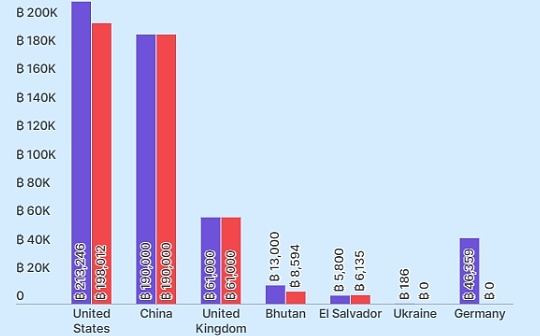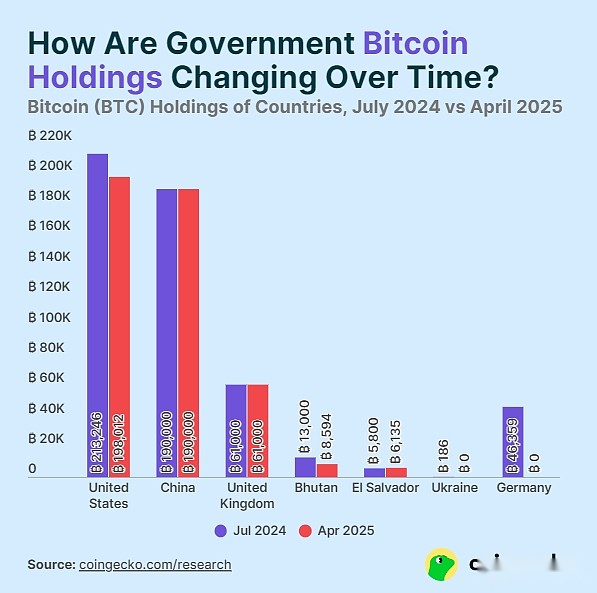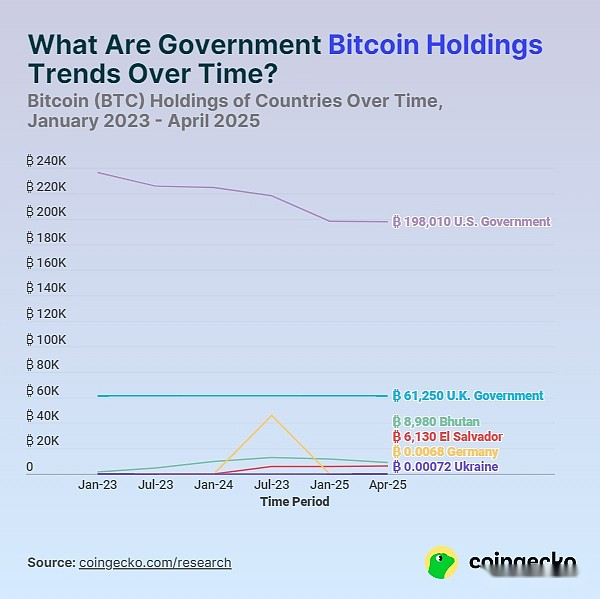
Source: Coingecko; Compilation: Tao Zhu, Bitchain Vision
1. How much Bitcoin will governments hold in 2025?
As of April 2025, governments held more than 463,741 bitcoins, accounting for about 2.3% of the total Bitcoin supply.This is a drop from the 529,591 bitcoins reported in July 2024, indicating that governments are still continuing to participate in cryptocurrency investments.Some countries such as El Salvador and Bhutan have actively increased their holdings of Bitcoin, while others such as the United States and Germany have liquidated their reserves.

2. How does government Bitcoin holdings change over time?
Governments have been involved in the holding of Bitcoin for many years, mainly through seizure, donation, active purchase and mining.This section tracks changes in government reserves from January 2023 to April 2025:

USA
The U.S. government remains the largest Bitcoin holder, holding about 198,012 bitcoins (worth approximately $18.3 billion as of April 2025).However, this figure has dropped slightly from July 2024 as the government liquidated some of its holdings.One major development is the signing of an executive order in March 2025 by President Donald Trump to establish “Digital Knox” — a strategic cryptocurrency reserve that integrates confiscated Bitcoin assets.
China
Despite banning cryptocurrency trading and mining, China remains the second largest government Bitcoin holder, currently holding 194,000 bitcoins (worth approximately $17.6 billion).Most of these assets are derived from the 2019 PlusToken Ponzi scheme.Although China has not liquidated these holdings, the government remains tight-lipped about future plans.
U.K.
The UK holds 61,000 Bitcoins (approximately $5.6 billion), all obtained through crime-related seizures.The government has not yet decided whether to sell these assets or use them for public financial needs, as suggested in recent policy discussions.
Bhutan
Bhutan has quietly accumulated 8,594 bitcoins (approximately US$795.4 million), all achieved through sustainable Bitcoin mining powered by hydroelectric power.The country continues to expand its mining operations, making it a rare case in which the government accumulates Bitcoin through direct mining rather than seizure or purchase.
El Salvador
El Salvador has steadily increased its Bitcoin reserves to 6,135 bitcoins (approximately $567.8 million).As part of President Naibu Bukel’s long-term strategy to integrate Bitcoin into the national economy, the country continues to buy 1 bitcoin a day.
Ukraine
Since 2024, Ukraine has received a surge in Bitcoin donations, with a total of 256 BTC (about 21.3 million US dollars).These funds have been completely liquidated and used for military and humanitarian assistance in ongoing conflict.
Germany
Germany liquidated all of its 46,359 BTC (approximately $3.9 billion) bitcoin holdings in mid-2024, causing a 15.7% drop in Bitcoin price.This case illustrates how the government’s sale of Bitcoin significantly affects the cryptocurrency market.
3. How does the government obtain Bitcoin?
Seize assets
The United States, China and the United Kingdom have obtained Bitcoin through law enforcement actions to combat cybercrime and fraud.The United States holds 198,012 bitcoins, mainly from the “Silk Road” and Bitfinex hacking.China’s 190,000 bitcoins came from the PlusToken Ponzi scheme, while the UK seized 61,000 bitcoins from money laundering cases.
Active purchases
El Salvador is the only country that actively buys Bitcoin, buying 1 bitcoin every day since November 2022.The country currently holds 6,135 bitcoins and regards it as part of its national financial strategy, treating Bitcoin as a long-term reserve asset.
Mining
Bhutan uses its abundant renewable energy resources to accumulate Bitcoin using hydropower mining.This mining program offers a unique approach to government-led accumulation of bitcoin without having to buy directly on the market.
Donate
Ukraine has received more than 256 Bitcoin donations from international supporters to fund military and humanitarian efforts.Most of these funds were quickly cashed in to cover emergency expenses, with only a small amount of balance remaining in government wallets.
4. Why did the government sell Bitcoin?
Not all governments choose to hold Bitcoin for a long time—some governments choose to liquidate their holdings for a variety of reasons.
Budget limits
Countries facing fiscal deficits, such as Germany, have sold Bitcoin to cover the budget deficit.In mid-2024, Germany liquidated 46,359 bitcoins, causing a market downturn.
Market opportunity
Governments may strategically sell bitcoin when prices are high to maximize returns.These sales can generate substantial revenue, but they can also affect market stability.
Legal obligations
Seized Bitcoin is usually forced to liquidate.For example, the United States regularly auctions confiscated Bitcoins because state laws require the exchange of seized assets into fiat currency.
5. Governments holding Bitcoin
The top five governments holding large amounts of Bitcoin are:









